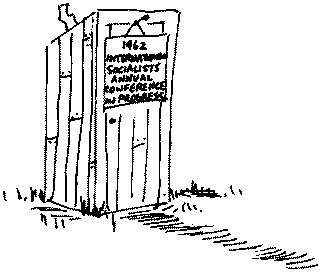
MIA > Archive > P. Foot > Why you should be a socialist
‘And Ewan was saying, “Yes that seems sense and I’ll look it up. I’ve always thought socialism just a measly whine, Macdonaldish stuff and politicians’ patter. Different when you think of it as history-making, the working class to be captured and led: all right I’ll give the keelies a chance.”
‘Ellen said: “And don’t be so horribly superior. You’ll never lead if you can’t be an equal.”‘
Lewis Grassic Gibbon, Grey Granite
Well, why is it wanted? Many good socialists and radicals question the need for a party at all. They say: ‘We’ve been sold out by so many parties already, Communist Parties, Labour Parties of all descriptions. Can’t we just look after ourselves without a party?’
Such people might get some comfort from what I’ve written up to now about the strength and power of the rank and file and how that’s the only strength and power which can create a socialist society.
But just look back at the revolutions mentioned in the last chapter. In all except one of them, workers’ power was handed back by the Labour Parties or the Communist Parties. Only in Spain was there a bit of a fight to keep the workers’ councils – and then only a small one. In many other cases, workers throw up mass strike movements which come to the very brink of revolution, and then shrink back. That’s what happened in France in May 1968, the biggest general strike in world history. The workers had the whole capitalist state machine at their mercy, but, after a few moments’ hesitation they settled for a wage rise and handed back their power to the capitalist government. (The wage rise, of course, lasted about eighteen months of inflation, and then the workers were back where they started.)
In every case, there was a crisis of confidence. The workers had no trusted organisation which could show the way to a new social order. They had no confidence in anything but the old order, and so accepted the ‘devil they knew’.
The exception, of course, was in Russia where the Bolshevik Party had, by a mixture of careful organisation and brilliant political judgement, built up a mass following.
There were Bolsheviks arguing and agitating in every workshop and every factory. So, as the old order tottered, there was someone to point the way to the new order: a group of men and women with a mass following who could declare: ‘Now is the time! Seize it!’
Before the revolution, the Bolsheviks took part eagerly in every little battle of the workers, every wage battle, every fight for better safety conditions in the factory, every demonstration against inadequate hospitals or schools. They fought every little battle eagerly as if it were the main one. They fought those little battles not only because each of them wanted better conditions in themselves, but because a victory on one little front was a further step towards the toppling of the profit system.
Only the working masses can change society; but they will not do that spontaneously, on their own. They can rock capitalism back on its heels but they will only knock it out if they have the organisation, the socialist party, which can show the way to a new, socialist order of society. Such a party does not just emerge. It can only be built out of the day-to-day struggles of working people. Many of those struggles are won or lost according to the extent of socialist organisation in the workplace. Sackings, cuts, wage freezes, speed-ups, discrimination against black workers, against women, all these will be fought more successfully where socialists are organised.
Socialists engage at every level in every little battle. They find immediately that the workers are not uniform. Some of them vote Tory. Some even vote for the National Front, and are openly and obscenely racialist. Some are committed revolutionaries. Most are none of these things. In the middle is a wide range of different ideas, often mixed up and confused, always changing and changeable, but nevertheless different.
The first job of the socialist party is to pool the resources and experience of the socialists; to give every isolated socialist the confidence to organise and argue for socialist policies among his or her workmates, neighbours and companions.


For the socialist who organises or argues on his own life becomes increasingly difficult. People see him as a bit of a crank. He has little access to written material, or help from neighbouring factories or towns. His isolation worries him, slows down his agitation and often corrupts him.
Rank and file militancy, by its nature, rises and falls at different periods. But socialists, organised together, go on fighting through the ups and downs of militancy.
Rank and file militants often come across barriers in their path, which hold them up and often turn them off down a hopeless road. Militants in factories opposing a closure or sackings in a clothing factory might be told:
‘Of course if Britain would only keep all those cheap clothes out of the country, the jobs would be secure.’
It seems an easy solution, and only the socialists are going to point out that import controls mean more expensive goods in the shops – and unemployed workers somewhere across the sea.
Socialists straddle the barriers of country.
Through their contact with socialists elsewhere they can keep themselves and their fellow workers informed of what is happening in Chile, in Thailand, in South Africa. Their inspiration is always international, because as socialists they know that socialism has nothing to do with geographic barriers, but to do with human beings wherever they live. But the confidence to argue the international case depends fundamentally on socialist organisation across national boundaries.
Perhaps the most important barrier straddled by the socialists is the barrier of past and present. The workers have a history which their rulers desperately try to hide from them. The story of all progress in the last hundred years is the story of the workers’ movement: the struggles for the freedom to vote, the freedom of the press, the right to demonstrate, all these were not part of the capitalist tradition, as Tory spokesmen constantly pretend. They would never have been granted if it had not been for workers’ struggle and sacrifice.
Reading, writing about and publishing the history of the workers is one of the main jobs of the Party.
We know that we must never again go into a General Strike and leave the leadership in the hands of the General Council of the TUC. How do we know it? Because we know what happened last time. We know that we must not let fascists have ‘the right to free speech’. Why do we know it? Because we know that last time free speech for fascists led to genocide.
The party, with its publications and its discussions, keeps that knowledge alive. The party, someone once said, is the memory of the class. That’s right.
But the central argument for a strong socialist party is founded on the strength and coordination of capitalism. More than once in this pamphlet I’ve referred to the ‘state machine’, the centralised power of the capitalist corporations, whose armies and newspapers and law courts are carefully marshalled in their class interest.
Capitalists quarrel from time to time. They argue about tactics and squabble over their ill-gotten gains. But in the face of workers’ resistance, they join ranks and coordinate their forces. If the workers are to break that machine, they too need centralised and disciplined organisation. They too need to be able to move quickly and link up their power. Once coordinated, their power is far stronger than that of the capitalists, but unless it is coordinated, the capitalists can divide and rule.
Many workers accept the socialist argument, but they have a healthy contempt for ‘fringe groups’. They find it difficult to identify with small groups of fanatics who talk a language all of their own and seem more interested in bickering with one another than in winning the argument for socialism among real working people.
It is true that the ideas of revolutionary socialism do attract groups of people who preach like the Dissenting religious sects of the last century. These people are inspired by the idea of a ‘millennium’, a sudden convulsive burst into the promised land. But they are terrified by the gulf between this ‘promised land’ and the stubborn refusal of workers to move towards it. They take refuge in their own smallness. They comfort themselves that one day the workers will move, and will look for leadership. And so they seek to build that leadership among themselves, a leadership which preaches at workers from on high.
Their aim is theoretical purity – but theoretical purity without any contact with real life or real human conditions. So they turn in among themselves, purge themselves of deviants, and pour oceans of bile on one another in order to prove their purity. They develop a language peculiar only to themselves which frustrates and embarrasses workers who come in contact with it.
 |
The International Socialists started in the early 1960s as a very small ‘fringe group’. We were sustained by a number of ideas which marked us off from the other socialists. We argued that the apparently benign and stable capitalism of that time would not last; that it was propped up by arms spending which carried in itself the seeds of contradiction and crisis; and that Labour governments would be impotent to resist the demands of capitalism as it slumped into that crisis.
We argued for a new, rank and file, revolutionary socialist party. But above all we argued that such a party could not be built separately from the lives and conditions of the working people. It had to be a party of working people, which lived and breathed real lives and real aspirations. The party, in other words, could not be substituted for the class. It was impossible to think straight without involving ourselves and acting with workers who were not yet convinced, without talking and writing in a language which people understood.
We looked, always, outwards, not inwards. And, as the predictions about capitalist instability started to come true, so we won people to our ideas. In 1968, at the peak of the movement against American invasion and war in Vietnam we won a few hundred students and white collar workers. Out of the great struggles against the Tory government we were joined by some two thousand workers who kindled socialist ideas at the root of the movement. During the first months of the Labour government, when many workers were prepared to take it easy and ‘give this lot a chance’ we maintained our membership and continued to argue that this Labour government would capitulate even more abjectly than its predecessors.
Now the Labour government is stumbling to another defeat. Now the people who argued in the 1950s and 1960s that the problems of capitalism could be solved by printing money and planning the economy through parliamentary legislation are in full flight. There are no reformers left. Roy Jenkins, for instance, former Labour Chancellor and Home Secretary, a symbol of ‘slow, civilised reform’ is taking flight to the European Commission, where, at a salary of £60,000 a year, he will be safe from democratic argument or criticism. With him goes David Marquand, a leader of the younger ‘gradual reformers’ of the postwar years. Most of the other reformers are now vying with each other in their demands for more government spending cuts, for more sick people, more poor people, more people out of work.
And at the same time the right wing are on the offensive. This is not the cosy, liberal right wing which governed in the Tory years of 1951 to 1964 or even from 1970 to 1974. This is a hard, racialist right which is challenging the soft right in every department of the state.
In newspapers and in television, in the army, in the secret service and in the police, in the law courts and in the civil service, crude, reactionary ideas which are borrowed straight from the dark years which preceded and followed the 1926 General Strike are openly peddled. The chinks in the system which opened out in the boom years, and through which reforming journalists, feminists, law reform enthusiasts and left-wing trade union leaders were able to argue radical and even socialist ideas are being suddenly and systematically closed. What happened in Chile, in Cyprus, in Thailand are now no longer far-off nightmares. They are realities which could plunge the entire world into a more horrific holocaust than Marx himself ever imagined.
All these developments have left us more and more on our own in the struggle for a socialist society. Increasingly, the International Socialists are the only people who are challenging racialism in a systematic and organised fashion; or arguing against the pay curbs; or fighting for the right to work.
Hundreds of thousands of working people are outraged at the cuts which are being made in their living standards. Many of these place the responsibility for these cuts on a bankrupt and corrupt capitalism. It is time that these people turned their outrage into commitment to a new socialist party.
It is time for working women to commit themselves. Politics is not a man’s business. A socialist party can never be successful if it is essentially a masculine organisation. In the great uprising in Paris in 1848, Jenny d’Hericourt warned the masculine democrat forces against the ostracism of women.
‘I tell you this in all sincerity: all your struggles are in vain, if women do not march with you.’
That is even more true today. No revolutionary organisation can be built in the working class unless women join it and seek to lead it.
We socialists are not fanatics or timeservers. We are socialists because we see the prospect which life holds out for all working people. We want the commitment of workers who laugh and love and want to end the wretchedness and despair which shuts love and laughter out of so many lives.
We do not have to spend the rest of our lives, and to leave our children to spend the whole of their lives, wrestling in struggle against a mean and despotic ruling class. Society can be changed, but only if masses of working people abandon the rotten shipwreck of the ‘leave it to us’ reformers, and commit themselves to change from below.
We are the infant of a socialist party which can transform society.
Will you help us grow?
Last updated on 7.1.2005